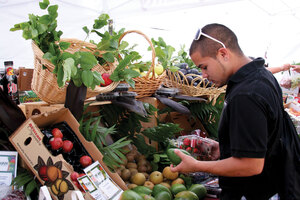With students increasingly concerned about health and sustainability, eating organic produce has become more common. In response, a number of farmers markets have popped up around campus — but it may be that these farmers markets are not the healthiest, freshest or most economical way to get food.
There are currently four farmers markets easily accessible to USC students: one run by USC Hospitality at the University Park Campus, one at the Health Sciences Campus, a weekly market on Shrine Place and a weekend farmers market at Exposition Park. The Hospitality-run markets began last year, but the others are recent additions to the organic scene.

Eat fresh · Jarod Wunneburger, a senior majoring in sociology, inspects produce at USC Hospitality’s Trojan Fresh Market on Sept. 17. The Trojan Fresh Market is one of many options available on and around campus for students to buy organic food. - Dieuwertje Kast | Daily Trojan
But some experts say students might want to think twice before they flock to farmers markets.
Dr. Roger Clemens, an expert in food industry and health trends and an adjunct professor at the USC School of Pharmacy, said the miscalculation of the health benefits of organic foods — which are often a major selling point at farmers markets — is the only thing that has turned the organic food market into a viable one.
“There’s a perceived health difference. Perception drives much of the market. It’s kind of a placebo effect,” Clemens said.
According to Clemens, the nutritional value from an organic apple, for example, is negligible compared to that of a conventionally farmed apple. Citing a study published in the American Journal of Public Health in July, Clemens said it appears there is no connection between nutrition and organic farming, despite the perception that this connection exists.
“The only thing that the organic food has added so far is a cost to your pocketbook,” Clemens said.
Clemens estimated organic foods can cost 30 to 50 percent more than their conventionally farmed counterparts.
Jackie Matthews, a sophomore majoring in print journalism, said it is this cost difference that often keeps her away from organic foods.
“I feel healthier when I eat organic food, but it’s too expensive for my whole diet to consist of it,” she said.
But Matthew Oden, USC’s Sustainability Program Manager, said there are benefits to eating organic beyond just nutritional value and these benefits make it worth the cost.
“Organic food is a huge step in the right direction,” he said.
Oden said organic food is beneficial to the environment because less land is used in organic farming. He said those who can afford to buy organic should do so, even though the foods are a little pricier.
“I think anyone who can help to purchase organically grown products should,” Oden said. “We’re talking 20 cents or 50 cents more on common items. I think most of us could definitely find a way to save eight bucks a week in another area.”
But with the cost of organic food higher than that of conventionally farmed foods, college students are not always willing to spend the extra money, said Riti Chandiok, a sophomore majoring in environmental studies who is also co-president of the Environment First club.
“Not only is organic food more expensive, but it’s not as easily accessible,” Chandiok said.
Chandiok noted the on-campus farmers market — the one most accessible for students — cannot compete with the markets at the Shrine and Exposition Park in terms of size, making it an unreliable means for organic grocery shopping, even if there is student interest.
And it seems the cost and unreliability have kept students away, despite their interest in eating organic.
Spencer Trujillo, a senior majoring in economics, said he goes to the on-campus farmers market occasionally, but does not make a point of it.
“I would go, but it depends if I’m headed to class or what my schedule is or if it catches my eye,” he said.
Marcos Diaz, a sophomore majoring in broadcast journalism, echoed this sentiment.
“I like organic food, but I won’t go out of my way to get it,” he said.
The post Options abound, but organic might not be worth it appeared first on Daily Trojan.